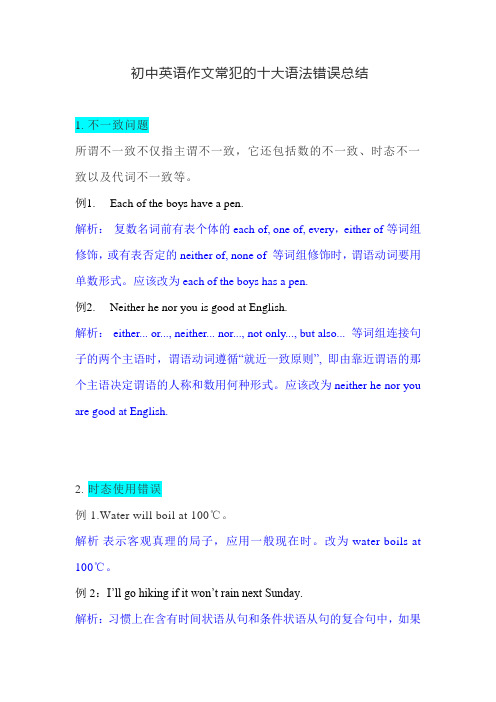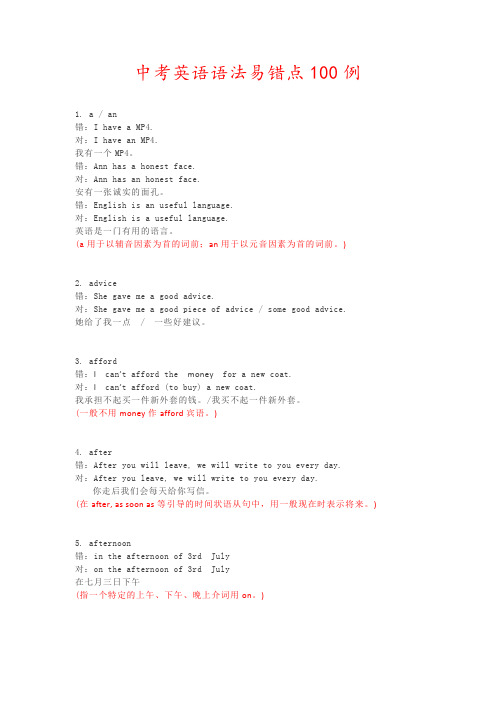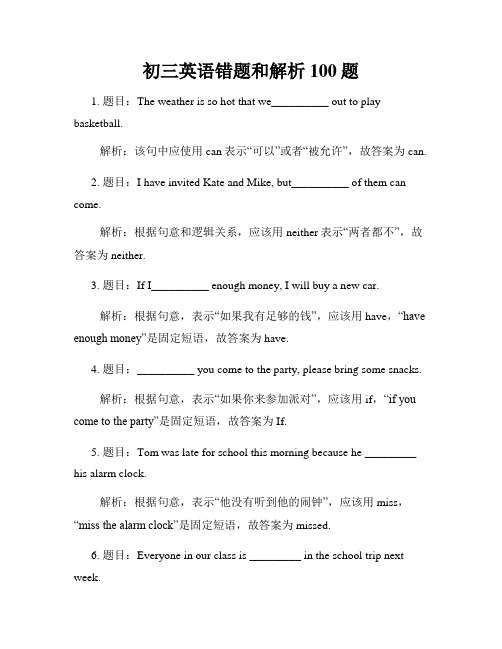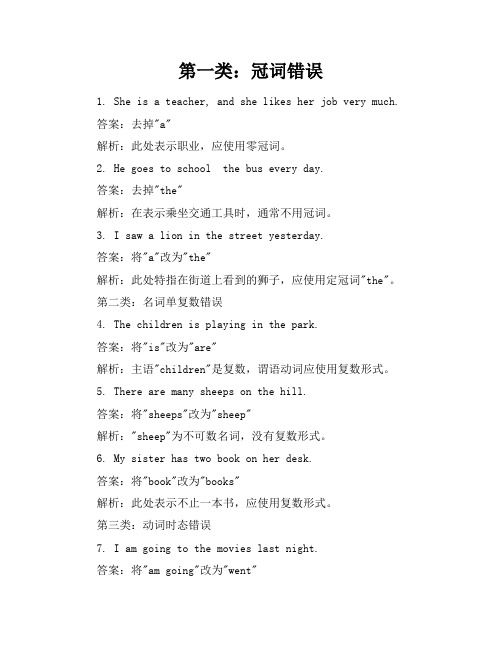初中英语常见错误100例解析
初中英语作文常犯的十大语法错误总结

初中英语作文常犯的十大语法错误总结1. 不一致问题所谓不一致不仅指主谓不一致,它还包括数的不一致、时态不一致以及代词不一致等。
例1.Each of the boys have a pen.解析:复数名词前有表个体的each of, one of, every,either of等词组修饰,或有表否定的neither of, none of 等词组修饰时,谓语动词要用单数形式。
应该改为each of the boys has a pen.例2.Neither he nor you is good at English.解析:either... or..., neither... nor..., not only..., but also... 等词组连接句子的两个主语时,谓语动词遵循“就近一致原则”, 即由靠近谓语的那个主语决定谓语的人称和数用何种形式。
应该改为neither he nor you are good at English.2.时态使用错误例1.Water will boil at 100℃。
解析表示客观真理的局子,应用一般现在时。
改为water boils at 100℃。
例2:I’ll go hiking if it won’t rain next Sunday.解析:习惯上在含有时间状语从句和条件状语从句的复合句中,如果主句的谓语动词用了一般将来时,从句的谓语动词要用一般现在时表示将来的动作。
应该改为:I’ll go hiking if it doesn’t rain next Sunday.例3:Teacher told us yesterday that the earth went around the sun.解析:习惯上在含有宾语从句的复合句中,主句的谓语动词用了一般过去时,从句的谓语动词要用过去的某种时态。
但如果从句表述的是一客观事实或客观真理时,则不受主句时态的影响,而用一般现在时。
中考英语语法易错点100例

中考英语语法易错点100例1. a / an错:I have a MP4.对:I have an MP4.我有一个MP4。
错:Ann has a honest face.对:Ann has an honest face.安有一张诚实的面孔。
错:English is an useful language.对:English is a useful language.英语是一门有用的语言。
(a用于以辅音因素为首的词前;an用于以元音因素为首的词前。
)2. advice错:She gave me a good advice.对:She gave me a good piece of advice / some good advice.她给了我一点/ 一些好建议。
3. afford错:I can’t afford the money for a new coat.对:I can’t afford (to buy) a new coat.我承担不起买一件新外套的钱。
/我买不起一件新外套。
(一般不用money作afford宾语。
)4. after错:After you will leave, we will write to you every day.对:After you leave, we will write to you every day.你走后我们会每天给你写信。
(在after, as soon as等引导的时间状语从句中,用一般现在时表示将来。
)5. afternoon错:in the afternoon of 3rd July对:on the afternoon of 3rd July在七月三日下午(指一个特定的上午、下午、晚上介词用on。
)6. all错:We all were delighted when we heard the news.对:We were all delighted when we heard the news.我们听到这个消息都很高兴。
初三英语错题和解析100题

初三英语错题和解析100题1. 题目:The weather is so hot that we__________ out to play basketball.解析:该句中应使用can表示“可以”或者“被允许”,故答案为can.2. 题目:I have invited Kate and Mike, but__________ of them can come.解析:根据句意和逻辑关系,应该用neither表示“两者都不”,故答案为neither.3. 题目:If I__________ enough money, I will buy a new car.解析:根据句意,表示“如果我有足够的钱”,应该用have,“have enough money”是固定短语,故答案为have.4. 题目:__________ you come to the party, please bring some snacks.解析:根据句意,表示“如果你来参加派对”,应该用if,“if you come to the party”是固定短语,故答案为If.5. 题目:Tom was late for school this morning because he _________ his alarm clock.解析:根据句意,表示“他没有听到他的闹钟”,应该用miss,“miss the alarm clock”是固定短语,故答案为missed.6. 题目:Everyone in our class is _________ in the school trip next week.解析:根据句意,表示“对下周的学校旅行感到兴奋”,应该用excited,“excited about the school trip”是固定短语,故答案为excited.7. 题目:The film was _________ good that I watched it twice.解析:根据句意,表示“这部电影非常好”,应该用so,“so good”是固定短语,故答案为so.8. 题目:Jennifer has been _________ for ten years. She knows a lot about fashion.解析:根据句意,表示“Jennifer从事时尚工作已经十年了”,应该用in,“in fashion”是固定短语,故答案为in.9. 题目:I'm sorry I _________ my key at home. I can't get into the house.解析:根据句意,表示“我把我的钥匙忘在家里了”,应该用left,“left my key at home”是固定短语,故答案为left.10. 题目:The little girl _________ at the sight of the spider.解析:根据句意,表示“小女孩一看到蜘蛛就哭了”,应该用cried,“cried at the sight of the spider”是固定短语,故答案为cried.......(继续完成剩余的90道题目)通过以上100道题目的解析,我们可以学到很多英语知识和语法规则。
英语语法错误分类(史上最全)

英语语法错误分类(史上最全)一.不一致(Disagreements)所谓不一致不光指主谓不一致,它还包括了数的不一致时态不一致及代词不一致等.例1.When one have money ,he can do what he want to .(人一旦有了钱,他就能想干什么就干什么.)剖析:one是单数第三人称,因而本句的have应改为has ;同理,want应改为wants.本句是典型的主谓不一致.改为:Once one has money ,he can do what he wants (to do) 二.修饰语错位(Misplaced Modifiers)英语与汉语不同,同一个修饰语置于句子不同的位置,句子的含义可能引起变化.对于这一点中国学生往往没有引起足够的重视,因而造成了不必要的误解.例1.I believe I can do it well and I will better know the world outside the campus.剖析:better位置不当,应置于句末.三.句子不完整(Sentence Fragments)在口语中,交际双方可借助手势语气上下文等,不完整的句子完全可以被理解.可是书面语就不同了,句子结构不完整会令意思表达不清,这种情况常常发生在主句写完以后,笔者又想加些补充说明时发生.例1.There are many ways to know the society. For example by TV ,radio ,newspaper and so on .剖析:本句后半部分"for example by TV ,radio ,newspaper and so on .”不是一个完整的句子,仅为一些不连贯的词语,不能独立成句.改为:There are many ways to know society ,for example ,by TV ,radio ,and newspaper.四.悬垂修饰语(Dangling Modifiers)所谓悬垂修饰语是指句首的短语与后面句子的逻辑关系混乱不清.例如:At the age of ten, mygrandfather died. 这句中"at the age of ten"只点出十岁时,但没有说明” 谁”十岁时.按一般推理不可能是my grandfather, 如果我们把这个悬垂修饰语改明确一点,全句就不那么费解了.改为:When I was ten, my grandfather died.例1.To do well in college, good grades are essential.剖析:句中不定式短语“to do well in college” 的逻辑主语不清楚.改为:To do well in college, a student needs good grades.五.词性误用(Misuse of Parts of Speech)“词性误用”常表现为:介词当动词用;形容词当副词用;名词当动词用等.例1.None can negative the importance of money.剖析:negative 系形容词,误作动词。
初中英语常考改错练习题(共十八类100题,附参考答案和解析)

第一类:冠词错误1. She is a teacher, and she likes her job very much.答案:去掉"a"解析:此处表示职业,应使用零冠词。
2. He goes to school the bus every day.答案:去掉"the"解析:在表示乘坐交通工具时,通常不用冠词。
3. I saw a lion in the street yesterday.答案:将"a"改为"the"解析:此处特指在街道上看到的狮子,应使用定冠词"the"。
第二类:名词单复数错误4. The children is playing in the park.答案:将"is"改为"are"解析:主语"children"是复数,谓语动词应使用复数形式。
5. There are many sheeps on the hill.答案:将"sheeps"改为"sheep"解析:"sheep"为不可数名词,没有复数形式。
6. My sister has two book on her desk.答案:将"book"改为"books"解析:此处表示不止一本书,应使用复数形式。
第三类:动词时态错误7. I am going to the movies last night.答案:将"am going"改为"went"解析:句子描述的是过去的事情,应使用一般过去时态。
8. They have finished their homework and go home.答案:将"go"改为"went"解析:根据上下文,这里应该使用过去时态,与前面的"finished"保持一致。
初中英语的语法错误总结

初中英语的语法错误总结在初中英语学习过程中,学生们常常会犯一些语法错误。
这些错误可能是由于对英语语法规则的理解不够清晰,或者是由于词汇使用不当而导致的。
本文将总结初中英语学习中常见的语法错误,并提供一些纠正这些错误的方法。
1.主谓一致错误(Subject-Verb Agreement Errors)主谓一致是英语语法中的一个重要概念。
当主语为单数时,动词应用单数形式;当主语为复数时,动词应用复数形式。
然而,初中学生常常在这方面犯错误。
例如:错误示例:She go to school every day.正例:She goes to school every day.纠正方法:当主语为第三人称单数时,动词应使用单数形式。
2.时态错误(Tense Errors)时态指的是动词所表示的动作或状态发生的时间。
初中学生常常在时态的使用上出现错误。
例如:错误示例:Yesterday, I see a movie.正例:Yesterday, I saw a movie.纠正方法:使用一般过去时来表达过去发生的动作。
3.冠词错误(Article Errors)冠词是用于具体化名词的语法成分,初中学生常常搞混冠词的使用规则。
例如:错误示例:I want to eat apple.正例:I want to eat an apple.纠正方法:当我们指的是一种特定的事物时,使用冠词"a"或"an"。
4.代词错误(Pronoun Errors)代词是用于指代名词的,但初中学生常常在代词的使用上出现错误。
例如:错误示例:Marry and me are going to the park.正例:Marry and I are going to the park.纠正方法:当代词作为主语时,应使用主格形式。
5.句子结构错误(Sentence Structure Errors)句子结构是指句子的组成方式和顺序,初中学生常常在句子结构上出现错误。
中考英语100句子改错

中考•语法|考生最容易犯的100个语法错误,现在改正还来得及!写作中,学生们常常掌握不好名词的可数性、所有格以及一些集合名词的用法。
1。
He gave me a very good advice yesterday.句中的a要去掉,因为advice是不可数名词.一些汉语概念为可数的词在英语中却是不可数的,表示数量时在其前加a piece of,类似的词有:news,bread,work, paper, chalk, furniture, information等等.2。
That girl loves reading book.可数名词单数不能孤零零地放在句子里,或前面加冠词,或将其变为复数.此处最好变为books.3。
He went into a book’s shop and bought a dictionary。
一般表示有生命的东西的名词的所有格用’s,如my mother’s car, 而此处适宜用名词修饰名词,改为a book shop。
4。
My family is watching TV.一些集合名词如看成一个整体,则用单数的谓语动词,如My family is a happy one;如强调集合中每个个体的个人行为,则用复数的谓语动词.此处看电视是个体行为,应把is改为are。
类似的词有:team,class, audience等。
5。
I bought some potatos and tomatos at the supermarket.中学阶段以“o”结尾的名词中有四个词变复数时要加es,它们是tomato,potato,Negro, hero; 其余的都加s变为复数。
6.This has nothing to do with their believes。
(这和他们的信仰没关系。
)以f, fe 结尾的词变为复数时一般去f, fe 加ves,如knife—knives,thief—thieves; 而roof 和belief直接加s变为复数。
常见错误例解

常见错误例解常见错误例解Ⅰ. 拼写错误A. 词形变化的错误1. . Smoking is not permited here. (× )Smoking is not permitted here.2. She said that she prefered to stay at home. (× )She said t hat she preferred to stay at home.3. Everything is going on as planed. (× )Everything is going on as planned.4. You are always forgeting things. (× )You are always forgetting things .5. She wrote a letter to me at the begining of this term. (× )She wrote a letter to me at the beginning of this term.6. I'm afraid you have choosed a wrong subject . (× )I'm afraid you have chosen a wrong subject .7. Young pioneers welcame he foreign guests at the airport . (× )Young pioneers welcomed the foreign guests at the airport .8. Last year the river flew over it' s banks . (× )Last year the river flowed over its bank s.9. The big dictionary costed me 50 yuan. (× )The big dictionary cost me 50 yuan .10. His left leg was hurted in the accident. (× )His left leg was hurt in the accident .11. The news was spreaded here and there. (× )The news was spread here and there.12. Hearing the news , she bursted into tears. (× )Hearing the news , she burst into tears .13. She became thiner after her illness . (× )She became thinner after her illness . .14. She is friendlier today. (× )She is more friendly today.Ⅱ. 语法错误A. 名词的数和主谓一致1. fun 是不可数名词We had great funs at the party. (× )We had great fun at t he party.2. work, homework , housework 等是不可数名词Do you do any houseworks in your spare time? (× )Do you do any housework in your spare time?3. trousers 或a pair of trousers 才表示“裤子”The trouser I bought was too long for me. (× )T he trousers I bought were too long for me.The pair of trousers I bought was too long for me.4. thank 作名词常用复数形式thanksI can' t find words to express my thank to her . (× )I can' t find words to express my thanks to her .6.congratulation 和congratulationsPlease accept my congratulation on your success . (× )Please accept my congratulations on your success .“I t?s my birthday today. ”“Congratulations !” I sent hera letter of congratulation.7. police 作复数名词看待The police was right after the robbers . (× )The police were right after the robbers . The policemen were right after the robbers .8. people 作复数; person 是单数形式, persons 是复数形式There was not a single people in t hat room. (× )There was not a single person in that room.9.as well as 引出的部分不作主语的一部分The mother as well as her two daughters are in the kitchen . (× )T he mother as well as her two daughters is in the kitchen .10.together with 引出的部分不作主语的一部分11.The teacher together with her students have arrived.(× )The teacher together with her students has arrived.11. neither ? nor 连接的主语与邻近的谓语一致Neither h e nor you is right . (× )Neither he nor you are right.12.either ? or 连接的主语与邻近的谓语一致Either the children or their mother are coming for the books. (× ) Either the children or their mother is coming for the book.13. both ? and 连接的主语作复数形式看待Both the children and their mother is here. (× )Both the children and their mother are here.14. all 指物一般作单数看待All they need are here. (× )All they need is here.15. 由表语提示可知all 是单数或复数All I have is these books . (× )All I have are these books .16. 一段时间作单数看待Ten years are a long time in one' s life. (× )Ten years is a long time in one' s life.17. 一笔钱作单数看待One million dollars were lent to him. (× )One million dollars was lent to him.18. each 作副词时不能影响谓语的形式The students each has a dictionary. (× )The students each have a dictionary.Each student has a dictionary. Each of the students has a dictionary.19.分数作为单数或复数决定于后面的名词Three-fifths of his pay were spent on food and clothing.(× ) Three-f ifths of his pay was spent on food and clothing.Three-fifths of his books were on sciences .20. sort 作主语时谓语与单数名词一致That sort of children are easy to teach . (× )That sort of children is easy to teach .Children of that sort are easy to teach .21. the United States 是一个国名, 是单数名词The United States are in North America. (× )The United States is in North America .22.定冠词与形容词构成的名词作复数看待The sick is taken good care of in the hospital. (× )The sick are taken good care of in the hospital.The sick old man is taken good care of in the hospital.The patients are taken good care of in the hospital.B. 冠词23.in front of 和in the front of 有别There is a nice garden in the front of the house. (× )There is a nice garden in front of the house.There is a nice vase in the front of the room.24. 由普通名词组成的国名前加theIs Helen from United States ? (× )Is Helen from the United States?25. 江、河、湖、海及山脉名称前加thePacific Ocean lies between Asia and America. (× )The Pacific Ocean lies between Asia and America .26. 最高级形容词前加theThat tree is tallest in the area. (× )That tree is the tallest in the area .27.姓氏前加the 并用复数表示某姓一家人Greens will come for a visit and we are expecting to meet them. (× )The Greens will come for a visit and we are expecting to meet them.28. 短语one after the otherThey visited one city after other in China. (× )They visited one city after the other / another in China .29. 普通名词组成的专有名词前加theI was at People' s Square just now. (× )I was at the People' s Square just now. ·30. 由Day 组成的节日前不用冠词We had a wonderful time on the New Year ' s Day. (× )We had a wonderful time on New Year ' s Day.Where were you on Children' s Day? 31. all day/ night 和all the year roundThe patient slept very well all the nigh t. (× )The patient slept very well all night .They worked all day. They were busy all year round. (× )They were busy all the year round.32.句型pat / hit / strike sb. on the ...The teacher patted the boy on his head . (× )The teacher patted the boy on the head.The thief hit the policeman on the nose.33. elect , make 后补语如是头衔不用theMr Johnson was elected the chairman of the club. (× )Mr Johnson was elected chairman of the club.Carl was made monitor of the class .34. 冠词a 与an 的选择取决于元音音素, 不是元音字母Tom is a honest boy, isn' t he? (× )Tom is an honest boy, isn' t he?He studies in a university.35.代词. something, anything, everything, nothing 都是单数I noticed that something bad have happened. (× )I noticed that something bad has happened.I'm sure everything is all right.36. some( adj . ) 和some( pron. ) ofSome of people have given up smoking. (× )Some people have given up smoking.Some of the people have given up smoking.37. most( adj . ) 和most( pron. ) ofMost of students like sports . (× )Most students like sports .Most of the students like sports.38.few 和a fewI don' t like so many friends together ; I ' d prefer to talk with just few each time. (× )I don' t like so many friends together ; I ' d prefer to talk with just a few each time.39.little 和a littleThe doctor said hopelessly that there was a little he could do for the dying man. (× ) The doctor said hopelessly that there was little he could do for the dying man .40.it 和oneYour new bike looks nice. I'm going to buy it too. (× )Your new bike looks nice. I 'm going to buy one too.41.rest 和otherTen of them went shopping and the rest was in the library. (× )Ten of them went shopping and the rest were in the library.Ten of them went shopping and the other was / the others were in the library.42. 习惯上需要的所有格代词She said she had lost way. (× )She said she had lost her way.Are you still doing your homework ? I went on with my washing.Where are we going to spend our holiday?43. 名词化的所有格代词Bill is a good friend of my father . (× )Bill is a good friend of my father ' s .He is a good friend of mine.44. neither 和eitherI don' t like neither of the two films . (× )I don' t like either of the two films .I like neither of the two films .45.somebody' s 和somebody else' sIt ' s not her umbrella. It must be somebody' s . (× )It ' s not her umbrella. It must be somebody else' s .46.the other 和anotherOne of your shoes is dirty but another is clean. (× )One of your shoes is dirty but the other is clean .47. which 和whoWho of you can help me do the job ? (× )Which of you can help me do the job ?D. 形容词、副词的比较结构48. 比较时要排除“自身”( 用else)I like your shirt better than anything. (× )I like your shirt better than anything else.49.比较时要排除“自身”( 用other )China has a bigger population than any country in t he world. (× )China has a bigger population than any other country in the world.50. 同类的事物才能比较Her hair is longer than you. (× )Her hair is longer than yours .51.as . . . as 的结构The weather in the city is not as colder as in the country. (× ) The weather in the city is not as cold as in the country.52. more 和muchHer English is more better than mine. (× )Her English is better than mine.Her English is much better than mine.53.“不如”的表达方法Japan is less bigger than China. (× )Japan is less big than China.Japan is not bigger than China .Japan is not so/ as big as China .54. 两者之间的比较Helen is the cleverest one of the two girls. (× )Helen is the cleverer one of the two girls.55. 三者之间的比较不一定都要用最高级Bill is tallest than the two girls. (× )Bill is the tallest of the three children.Bill is taller than the two girls.56. much 修饰比较级的形容词或副词Tom runs much quickly than Dick . (× )Tom runs more quickly than Dick. Tom runs much more quickly than Dick .E . 情态动词57.must ( 必须) 的否定形式“Must I come at 8 o' clock ?” “No, you mustn' t . ”(× )“Must I come at 8 o' clock?”“No, you needn' t/ don' t have t o. ”58. may 的否定形式“May we go now? ” “No, you can ' t. ”(× )“May we go now?” “No, you mus tn' t . ”59. must ( 必定) 的否定形式She looks young; she mustn' t be fifty. (× )She looks young; she can' t be fifty.60.must do 和must have done ( 后者表示“一定已经??”)He seems to know everything about the story. He must read the book already. (× ) He seems to know everything about the story. He must have read the story already.61. ought 必与t o 连用Your ought have another try. (× )You ought to have another try.62. need 兼作情态动词和实义动词You don' t need go in such a hurry. (× )You needn' t go in such a hurry. You don' t need to go in sucha hurry.63. dare 兼作情态动词和实义动词Dare you to do that alone? (× )Do you dare to do that alone? Dare you do that alone?64. had better 可视为一个情态动词You had better not to take a train . (× )You had better not take a train .65. would rather 可视为一个情态动词I would rather to tell you the truth now. (× )I would rather tell you the truth now.F . 动词的时态66. 一般过去时与过去进行时合用的场合I wrote a letter when the telephone rang. (× )I was writing a letter when the telephone rang.67.“一次性”动作或出现在过去或出现在将来She posts the letter this morning. (× )She posted the letter this morning. She will post the letter this morning.68.过去确切时间所发生的动作多用过去进行时I did an important experiment at four o' olock yesterday afternoon. (× )I was doing an important experiment at four o' clock yesterday afternoon.69. 过去时间的动作不用现在完成时After the war was over , he has lived in Paris . (× )Since the war was over , he has lived in Paris.After the war was over , he lived in Paris .70. 在与现在有关的时间发生的动作可用现在完成时He made great progress this year . (× )He has made great progress this year .71. 表示理解和情感的动词用一般时而不用进行时She says she is hating you. (× )She says she hates you.72.条件状语从句中用一般现在时代替将来时If it will rain tomorrow, we' ll have to change our plan.(× )If it rains tomorrow, we' ll have to change our plan.73. 时间状语从句中用一般现在时代替将来时Please wait here till the rain will stop . (× )Please wait here till the rain stops .74. 过去发生的动作不用过去完成时He had lost the key to his bike. (× )He lost the key to his bike. He has lost the key to his bike. 75. 有明确的过去时间, 不能用现在完成时I h ave visited the museum last week. (× )I had visited the museum last week . (× )I visited the museum last week .76. 瞬时动词的现在完成时不和表示一段时间的状语合用T he old man h as died for a week . (× )The old man died a week ago.The old man has died.The old man has been dead for a week.It is a week since the old man died.77.过去完成时表示“过去的过去”, 常用于含有b y 引出的时间状语或从句的句子里By the time they returned, we already moved into the new house. (× )By the time they returned, we had already moved in to the new house.78.句中时态要呼应When I entered the room, I found that they are playing cards . (× )When I entered t he room, I found that they were playing cards .When I entered the room, I found them playing cards.79. 表示自然科学真理的语句总用一般现在时Scientists proved that the earth was round. (× ) Scientists proved that the earth is round.80. 祈使句含有将来的意味Give me more time, and I do it much better . (× )Give me more time, and I ' ll do it much better .Don' t move, or I kill you. (× )Don' t move, or I' ll kill you.G. 被动语态81. 一般时态的被动语态The bridge built la st year . (× )The bridge was built last year .82.完成时态的被动语态The old house had burned when the firemen arrived.(× ) The old house had been burned when the firemen arrived.83. 进行时态的被动语态Tall buildings are setting up in this city. (× )Tall building are being set up in this city.84. belong 是不及物动词, 无被动语态The book is not belonged to her . (× )The book does not belong to her .85. happen 是不及物动词, 无被动语态Please tell me what was happened. (× )Please tell me what happened.86.break out 和last 都是不及物动词, 无被动语态The war was broken out and it was lasted for four years. (× ) The war broke out and it lasted for four years .87.构成被动语态的动词词组必须完整, 其中的介、副词不能漏掉The boy made a face and was laughed. (× )The boy made a face and was laughed at .88.take care of 改成被动语态时不能漏掉介词ofT he parentless children are taken good care at school.(× )The pare nts …s ch ildren are taken good care of at school.89. 某些动词的主动式和被动式都正确, 用被动式时较为强调人为的因素Steam can change into water .Steam can be changed into water .The boy is hiding in the room. The boy is hidden in the room.An oil-painting is hanging on the wall. An oil-painting is hung on the wall.H. 虚拟语气90.从句与主句都用虚拟语气, 或都不用虚拟语气If he were rich , he will travel all over t he world. (× )If he were rich , he would travel all over the world. ·22·If he is rich , he will travel all over t he world. 91. if 从句将来式不用would If he would tell me the truth , I would help him. (× ) If he should/ were t o t ell me the truth, I would help him.92.从句和主句时态要基本一致I f she had been more careful, she would pass the exam yesterday. (× )I f she had been more careful, she would have passed the exam yesterday.93. wish 的宾语从句必须用虚拟语气I wish she can come tonight . (× )I wish she could come tonight .94.wish 的宾语从句的过去时要用过去完成式来表示I wish I didn' t make the wrong decision at that t ime.(× )I wish I had not made the wrong decision at that time.95. it' s time 后从句要用过去式动词It ' s time you go to bed now. (× )It ' s time you went to bed now.96. suggest 的宾语从句的虚拟语气I suggested that you went there at once. (× )I suggested that you ( should) got here at once.97.insist 的宾语从句的虚拟语气She insisted that we must start working without delay.(× )She insisted that we ( should ) start working without delay.98. suggest 和insist 的宾语从句并非一定用虚拟语气, 应视句义而定His pale face suggested that he should be ill. (× ) His pale face suggested that he was ill. ( suggest 作“暗示”解)She insisted that she should be from Beijing. (× )She insist d that she was from Beijing. ( insist 作“坚持认为”解)99.it' s necessary 后的主语从句用虚拟语气100.It ' s necessary that students will learn a foreign language. (× )It ' s necessary that students should learn a foreign language.。
- 1、下载文档前请自行甄别文档内容的完整性,平台不提供额外的编辑、内容补充、找答案等附加服务。
- 2、"仅部分预览"的文档,不可在线预览部分如存在完整性等问题,可反馈申请退款(可完整预览的文档不适用该条件!)。
- 3、如文档侵犯您的权益,请联系客服反馈,我们会尽快为您处理(人工客服工作时间:9:00-18:30)。
初中英语常见错误100例1. 老师对我很生气。
误:The teacher was angry to me.正:The teacher was angry with me.析:表示对某人生气,一般用介词with (有时也用at)。
表示对某事(物)生气,通常用介词at, about(在美国英语中也可以用with)。
2. 你寄出的信有回音没有?误:Have you had an answer of your letter?正:Have you had an answer to your letter?析:表示“对……的回答(答复)”,其后通常接介词to。
类似地,要表示“……的答案”,其后也接介词to:the answer to the exercises 练习答案3. 湖面结冰了,所以我们就从冰上走过。
误:The lake was frozen, so we walked through the ice.正:The lake was frozen, so we walked across the ice.析:across 和through 都可表示从一边到另一边的意思,但前者主要涉及平面(与on有关),而后者则主要涉及立体空间(与in 有关)。
4. 他不愿接受我的建议。
误:He wouldn’t get my advice.正:He wouldn’t take (follow, accept) my advice.析:表示接受意见或忠告,通常用动词take, follow, accept, act on 等,但不能用get。
另外:提出建议或忠告,通常用动词give;表示向某人请教或征求意见,一般用动词ask (for)。
5. “你自己能修吗?”“恐怕不行。
”误:“Can you repair it yourself?” “I’m not afraid.”正:“Can you repair it yourself?” “I’m afraid not.”析:比较:I’m not afraid. 意为“我不怕”;I’m afraid not. 意为“恐怕不行”“恐怕不会”“恐怕不是”等(表示委婉的否定)。
6. 读罢此信,他哭了。
误:After reading the letter, tears ran down his cheeks.正:After he read the letter, tears ran down his cheeks.正:After reading the letter, he burst into tears.析:after引导动名词作状语时,其逻辑主语应与句子主语保持一致。
7. 我们班又有五个学生入了团。
误:Five students in our class joined the League again.正:Five more students in our class joined the League.正:Another five students in our class joined the League.析:again 表示“又”“再”,指动作的反复;more 或another表示“再”“又”,指数量在原有基础上的增加。
若以上误句要视为正句,则表示:我们班有五位同学又入了一次团,即第二次入团。
8. 她入党有十年了。
误:It is ten years ago since she joined the Party.正:It is ten years since she joined the Party.正:She joined the Party ten years ago.析:“It is + 一段时间+ since...”是一句型,意为“……有一段时间了”,注意不要在该结构的since 前用ago。
9. 他们同意我做这事。
误:They agreed me to do it.正:They agreed to let me do it. / They agreed to my doing it.析:不要按汉语习惯用agree sb to do sth 来表示“同意某人做某事”,要表达此意,需改用其他结构。
10.要是他这样说,那他就是个骗子。
误:If he said so, and he is a liar.正:If he said so, he is a liar.析:if 引导的是条件状语从句,后面的句子为主句,其前不能用并列连词and(否则全句为并列句)11.这双鞋不相配,一只大,一只小。
误:These shoes do not match; one is large and another is small.正:These shoes do not match; one is large and the other is small.析:表示两者当中的另一个,要用the other,不用another。
12.今天下午我打过电话,但没人接听。
误:I telephoned this afternoon, but nobody received.正:I telephoned this afternoon, but nobody answered.析:表示接电话,英语习惯用动词answer。
顺便说一句,听见门铃或敲门声去开门,习惯上也用动词answer。
如:I knocked at the door ,but no one answered. 我敲了敲门,但没有人来开门。
13. 为什么不给她送些花呢?误:Why not give her any flowers?正:Why not give her some flowers?析:在表示请求或邀请的疑问句中,一般要用some,而不用any。
又如:Would you like some bananas? 吃香蕉吗?14.不久天空中出现了星星。
误:Soon the stars were appeared in the sky.误:Soon the sky appeared the stars.正:Soon the stars appeared in the sky.析:appear(出现)是不及物动词,因此其后不能有宾语,也不能用于被动语态。
15.她离开时,她的丈夫还在睡熟。
误:Her husband was very asleep when she left.正:Her husband was fast [sound] asleep when she left.析:要表示“睡得很熟”,asleep 不能用very 修饰,可用fast或sound 来修饰。
类似地还有:He’s in a sound sleep. 他睡得很香。
16. 他十分关心他的汽车。
误:He gives all his attentions to his car.正:He gives all his attention to his car.析:attention(注意)是不可数名词,不能用复数形式,也不能与不定冠词连用。
17.你的工作不好,但我的工作更糟。
误:Your work is bad, but mine is more bad.正:Your work is bad, but mine is worse.析:bad(坏的)的比较等级为不规则变化,即worse, worst。
使用时不要按汉语意思使用more bad这样的表达形式。
18. 因为下雨,所以我们只好呆在家里。
误:Because it was raining, so we had to stay at home.正:Because it was raining, we had to stay at home.正:It was raining, so we had to stay at home.析:because(因为)是从属连词,用以引导原因状语从句;而so(所以)是并列连词,用以连接并列句。
两者不可同用在一个句子中,改正的办法是:任意去掉其中的一个。
19. 他还是孩子时就开始喜欢诗歌。
误:He became to like poetry when he was a boy.正:He began to like poetry when he was a boy.析:表示开始做某事,英语可用begin [start] to do sth。
become 后习惯上不接不定式。
20. 躺在床上看书是个坏习惯。
误:It is a bad habit to read on bed.正:It is a bad habit to read in bed.正:It is a bad habit to read on a [the] bed.析:表示“在床上”,用介词on 或in 均可,但用on 时bed 前应有冠词,用in 时bed 前没有冠词。
但是若是指某一张具体的床,则也可能用两者,如:in [on] that bed (在那张床上),in [on] the same bed(在同一张床上)等。
另外,有时要暗示人身上盖有东西,也可能用in the bed。
21. “和我们一起玩好吗?”“谢谢,我非常愿意。
”误:“Will you join us?” “Thank you, my pleasure.”正:“Will you join us?” “Thank you, with pleasure.”析:my pleasure 主要用于回答感谢,其意为“别客气”“不用谢”;with pleasure 用于回答请求或邀请,其意为“好的”“没问题”“十分愿意”。
注:my pleasure 也可说成:It’s my pleasure. / It’s a pleasure. / Pleasure was all mine. / The pleasure is mine. 等。
22. 学生正在忙于准备期末考试。
误:The students are busy preparing the final examination.正:The students are busy preparing for the final examination.析:prepare sth=get sth ready(准备好某事),通常用于所需时间较短的动作;而prepare for sth=make preparations for sth(为某事作准备),通常用于所需时间较长的动作。
比较:prepare a meal=准备饭菜(指把饭菜煮好),prepare for a meal=为一顿饭作准备(可能包括买菜备酒等动作)。
